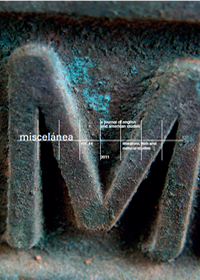Las metáforas provisionales de la postmodernidad: La obra de William Gass
DOI:
https://doi.org/10.26754/ojs_misc/mj.20119090Palabras clave:
Modernismo, Postmodernismo, Metáfora, Modelos, MetaficciónResumen
El filósofo Max Black demostró en 1962 que la metáfora es un recurso expresivo que no depende necesariamente de un factor exegético; propuso como alternativa al modo metafórico de cognición por analogía, vigente hasta ese momento, una concepción interactiva de la metáfora basada en su ‘intraducibilidad’. Así entendida, la metáfora emerge como una estrategia de resistencia epistemológica muy afín a algunos de los postulados fundamentales del modernismo y del postmodernismo. Este artículo defiende que la metáfora encuentra un lugar privilegiado en el postmodernismo, y que muchos escritores, —entre los que hay que destacar a William Gass por ser discípulo del propio Black— recurren a este tipo de metáfora de naturaleza interactiva como principio estructural de unas obras fundamentadas habitualmente en los procesos intuitivos de la metaficción; son piezas difíciles de traducir, verdaderas alegorías del acto de escribir y prototipos de integridad formal que paradójicamente logran que la utopía estética de sesgo modernista que inicialmente parecen esbozar, se desdibuje en un texto polimórfico y laberíntico cuya viabilidad tropológica resulta equívoca y provisional.Descargas
Referencias
Abish, Walter. 1974. Alphabetical Africa. New York: New Directions Books.
Barthelme, Donald. 1978. Unspeakable Practices, Unnatural Acts. New York: Pocket Books.
Black, Max. 1962. Models and Metaphors: Studies in Language and Philosophy. Ithaca, New York: Cornell U.P.
Boves, Carmen. 2004. La metáfora. Madrid: Gredos.
Brautigan, Richard. 1989. Trout Fishing in America. Boston: Houghton Mifflin & Seymour Lawrence.
Burkhardt, Frederick (ed.) 1981. The Principles of Psychology: Works of William James (3 vols.). Cambridge, MA: Harvard U.P.
Coover, Robert. 1989. Pricksongs and Descants. London: Minerva.
Gass, William H. 1954. “A philosophical investigation of Metaphor”. Ph.D Dissertation. Cornell University.
—. 1979a. Fiction and the Figures of Life. Boston: David R. Godine.
—. 1979b. The World Within the Word. Boston: David R. Godine.
—. 1981. In the Heart of the Heart of the Country. Boston: David R. Godine.
—. 1989. Willie Masters’ Lonesome Wife. Normal (IL): Dalkey Archive Press.
—. 1998. Cartesian Sonata and Other Novellas. New York: Alfred A. Knopf.
Goodman, Nelson. 1976. Los lenguajes del arte. Barcelona: Seix Barral.
Jameson, Frederic. 2007. The Modernist Papers. London and New York: Verso.
Leclair, Thomas and Larry McCaffery (eds.) 1982. Anything Can Happen: Interviews with Contemporary American Novelists. Urbana and London: University of Illinois Press.
Lentricchia, Frank and Thomas McLaughlin. (eds.) 1995. Critical Terms for Literary Study. Chicago and London: The University of Chicago Press.
Lodge, David. 1977. The Modes of Modern Writing. London, Melbourne and Auckland: Edward Arnold.
Mchale,Brian. 1987. Postmodernist Fiction. London and New York: Routledge.
Punter, David. 2007. Metaphor. London and New York: Routledge.
Ricoeur, Paul. 1977. La metáfora viva. Buenos Aires: Megápolis.
Sacks, Sheldon (ed.) 1979. On Metaphor. Chicago and London: The University of Chicago Press.
Santayana, George. 1900. Interpretations of Poetry and Religion. New York: Charles Scribner’s Sons.
Varsava, Jerry. 1990. Contingent Meanings: Postmodern Fiction, Mimesis, and the Reader. Gainesville (Florida): The Florida State U.P.
Wittgenstein, Ludwig. 1958. Philosophical Investigations. Oxford: Basil Blackwell.
Descargas
Publicado
Número
Sección
Licencia

Esta obra está bajo una licencia internacional Creative Commons Atribución-NoComercial 4.0.


